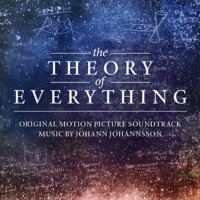- Composed by Jóhann Jóhannsson
- Backlot Music / 2014 / 50m
James Marsh’s film The Theory of Everything tells of the relationship between the extraordinary British physicist Stephen Hawking and his first wife, Jane, following his academic rise and physical fall in time with their personal rise and fall as he battles motor neuron disease. I suspect that most who are familiar with Icelandic composer Jóhann Jóhannsson are – like me – so because of his abrasive, minimalist score for the 2013 film Prisoners, for which he received much acclaim. This one couldn’t be more different in some senses – warm and romantic, melodic and frequently very happy, it cleverly combines a feeling of the wonder of life with the wonder of science. It is also highly elegant – in film music terms it is very much in the Alexandre Desplat mode (indeed, it is easy to imagine that the Frenchman’s score for this movie could have been just about identical) with a clinically precise recording highlight instrumental layers, a classical structure to the themes, an intriguing blend of the orchestral with a subtle use of more modern elements. There are also a few moments when Ennio Morricone seems to have been front and centre in the composer’s mind.
The first five cues are all light and airy, playful even at times, full of the exuberance of youth and the joy of falling in love. The sequence is ended by the dark, tense “Collapsing Inwards” where harsh reality appears to set in, then the extremely sad (and extremely impressive) “A Game of Croquet”, with a heartmelting piano theme. “The Origins of Time” is pure Morricone with its gradual construction then deconstruction of an idea; and later the gorgeous “The Wedding” is clearly modelled on the youth theme from Cinema Paradiso. After this, the score begins down a much darker road, with the tempo slowed down (perhaps a deliberate mirror of Hawking’s physical decline), fear and sadness beginning to overwhelm. Jóhannsson manages the contrast with real skill, at times even echoing the pattern of sunnier pieces earlier in the score but presenting them in much chillier guises. As the score nears its conclusion, the tone takes another turn, as life moves on and challenges are overcome. The Theory of Everything is an impressive piece of work, charting a difficult dramatic path with great skill and managing to combine very different pulls of emotion and drama into a coherent whole. Fans of Desplat in particular will surely find much to admire.
Rating: ****
facebook.com/moviewave | twitter.com/MovieWaveDotNet | amazon.com












Probably Best Score Winner on the next Oscar?
Well, if it wins, I won’t be sad, it’s an extremely beautiful score, especially the excellent cue “A Game of Croquet”.
this is such a beautiful score…compare to desplats´”the imitation game” i would gi for this one…so sensitive…nicely orchestrated!
and the golden globe goes to: hans zimmer for “intersetllar”, for sure!
greetz, dominique.
and all my best wishes for you james for 2015…thank you so much!!!
keep going…! 😉
Just watched the movie yesterday, and I realized that the music for the finale and the first part of the end credits is not included on the album. That’s sad because it’s a really beautiful and haunting piece of music.
However, on the film’s credits there is an additional composer listed, named Nicklas Schmidt. Did he composed the end credits piece? I think so, and that would explain it’s absence on the album (focused on Jóhannsson’s music).
The music for the finale is from a doc, The Crimson Wing: Mystery of the Flamingos. When I found out, it was very much like when I knew the Misty Mountain song from Hobbit wasn’t Shore’s work…
I have noticed that two tracks, namely “Chalkboard” & “The Dreams that Stuff Is Made Of” are mentioned to be composed by A. Desplat on the backtray of the physical CD release…How come anyone hasn’t mentioned/investigated Desplat’s involvement in the score yet?
Really? I only have it digitally.
[…] songs are light, airy, playful, full of the exuberance of youth and the joy of falling in love. Movie Wave says, “it cleverly combines a feeling of the wonder of life with the wonder of […]